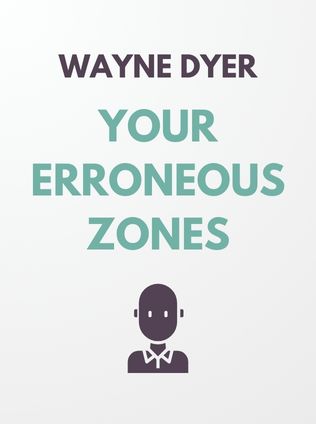
Your Erroneous Zones
By Wayne Dyer
Published 12/1993
About the Author
Wayne W. Dyer was a transformative figure in the world of self-development and motivation. Born in 1940, Dyer faced a challenging childhood, growing up in foster homes and dealing with various hardships. These early experiences shaped his perspective on life, leading him to a career focused on helping others overcome their internal struggles. Dyer initially pursued a career in academia as a professor of counselor education at St. John’s University in New York, where he began to develop his ideas about self-empowerment and positive thinking. His lectures on these topics caught the attention of a literary agent, who encouraged Dyer to put his ideas into writing. The result was his first book, Your Erroneous Zones, published in 1976. This book became a groundbreaking success, selling over 35 million copies worldwide and launching Dyer’s career as a prolific author and motivational speaker. Throughout his life, Dyer wrote more than 40 books, many of which became bestsellers, and he continued to inspire millions of people until his passing in 2015.
Main Idea
In Your Erroneous Zones, Wayne Dyer challenges the notion that external circumstances dictate our happiness. Instead, he argues that true happiness is a choice, and the only obstacles standing in our way are the self-defeating behaviors and thought patterns he calls "erroneous zones." These zones, which include guilt, worry, anger, and the need for approval, are mental traps that prevent us from living a fulfilling life. Dyer's central thesis is that by identifying and eliminating these erroneous zones, we can take control of our lives and achieve lasting happiness. His message is both empowering and practical, offering readers tools and strategies to break free from these limiting behaviors and embrace a life of purpose and joy.
Table of Contents
- Introduction to Erroneous Zones
- The Trap of Seeking Approval
- Breaking Free from Conformity
- The Importance of Being Present
- Overcoming Procrastination
- Letting Go of the Need for Fairness
- Managing Anger
- Strategies for Eliminating Erroneous Zones
Introduction to Erroneous Zones
Dyer begins Your Erroneous Zones by introducing the concept of erroneous zones—those self-defeating behaviors and thought patterns that prevent us from experiencing true happiness. He asserts that happiness is not something to be pursued externally; rather, it is a state of mind that we can choose to adopt at any moment. However, the challenge lies in overcoming the internal barriers—our erroneous zones—that keep us trapped in negative cycles of thinking and behavior.
Understanding Erroneous Zones
According to Dyer, erroneous zones are deeply ingrained habits of thought and behavior that we often develop in childhood and carry with us into adulthood. These zones manifest as feelings of guilt, worry, anger, and the need for approval, among others. They are the result of years of conditioning by parents, teachers, and society at large, which teach us to conform to certain expectations and to seek validation from others. Dyer argues that these erroneous zones are not only unnecessary but also harmful, as they prevent us from living authentically and achieving our full potential.
The Power of Choice
One of the key messages in Your Erroneous Zones is the power of choice. Dyer emphasizes that we have the ability to choose our thoughts and behaviors, and by doing so, we can free ourselves from the erroneous zones that hold us back. He writes:
"You are the sum total of your choices. If you can control the process of choosing, you can take control of all aspects of your life. You can find the freedom that comes from being in charge of yourself." — Wayne W. Dyer
This idea is both liberating and empowering, as it places the responsibility for our happiness squarely in our own hands. It challenges the common belief that we are victims of our circumstances and encourages us to take an active role in shaping our own lives.
The Trap of Seeking Approval
One of the most pervasive erroneous zones Dyer addresses is the need for approval from others. He explains that while it is natural to seek validation from those around us, this need becomes problematic when we prioritize others' opinions over our own. This behavior often stems from childhood, where we are conditioned to seek approval from parents, teachers, and peers. As we grow older, this conditioning can manifest in various ways, such as people-pleasing, avoiding conflict, and making decisions based on what we think others will approve of, rather than what we truly want.
The Impact of Seeking Approval
Seeking approval can have a profound impact on our lives, leading us to make choices that are not aligned with our true desires and values. For example, we might choose a career path that our parents approve of, even if it does not fulfill us. Or we might stay in a relationship that is no longer healthy because we fear disappointing our partner or family. Over time, this pattern of behavior can lead to a deep sense of dissatisfaction and a loss of identity, as we become disconnected from our true selves.
Sign up for FREE and get access to 1,400+ books summaries.
You May Also Like
The Subtle Art of Not Giving a F*ck
A Counterintuitive Approach to Living a Good Life
By Mark MansonRich Dad Poor Dad
What the Rich Teach Their Kids About Money - That the Poor and Middle Class Do Not!
By Robert T. KiyosakiHow To Win Friends and Influence People
The All-Time Classic Manual Of People Skills
By Dale CarnegieFreakonomics
A Rogue Economist Explores the Hidden Side of Everything
By Steven D. Levitt and Stephen J. Dubner



















